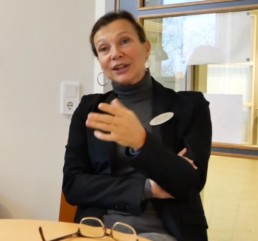Scientific digital schools in Uddevalla
Since 2018, Me Analytics AB and Chalmers University of Technology, together with the Municipality of Uddevalla, have been running a project that is about scientific education in a digital age. The project is based on a completely new digital scientific method that has come to be called “Scientific Social Media”—social media tailored for social science research.
The IT tool LoopMe is built to support schools that work scientifically according to the method. LoopMe is similar to social media platforms such as Twitter and Facebook, but is fully customized to collect large amounts of empirical data for research purposes. The tool has proven to work well for pedagogical action research, where a large number of teachers participate in research processes by studying their own practice in a systematic, coordinated, and documentary approach. Uddevalla Municipality has been a pioneer in the work of scientific social media.
The teachers who have participated stated that they now reflect more openly on their teaching, that they feel stimulated and that their own skills have increased. They are forced to think and develop more regularly as they move forward in the profession. They also commented on the amount of valuable time saved compared to other working methods. Their assignments in digital IT support have resulted in improved student relationships, safer corridors, more effective school start-ups, stronger workplace culture and staff participation, and much more.
The school leaders who have participated say that the way of working is an easier and more time-efficient way to develop the school. They also think they get a quicker idea of what works and what doesn’t, and can thus adjust much more quickly. The leaders like that they can get detailed “authentic” statistics to which they regularly return to analyse. An important issue that was raised early on was whether existing IT systems would suffice and that new IT support would be perceived as unnecessary. However, they now see that you do not “see” the whole picture with existing systems, and that it has not been as difficult as with other systems because it is so accessible to use. Finally, educational leadership has been strengthened through closer, more regular contact and dialogue with educators, as well as improved school management consensus.
Initially, there was some resistance, as well as many perfectly valid questions, which are now suitably answered. It also did not go as quickly as first announced, which in hindsight was a benefit, but now it is progressing more and more. Since we started, we have had very positive feedback from school leaders, teachers, and other staff. In the long term, it looks very encouraging, and you can already see that this will lead to better education in Uddevalla, which was the initial goal, and interest from outside of Uddevalla is substantial right now. The project’s way of working is also world-unique and is likely to spread widely throughout Sweden.
In this video (NB: in Swedish!), staff at two schools participating in the project talk about their impressions of how things went:
Skolutveckling på vetenskaplig grund i en digital tid from LoopMe on Vimeo.
Reduced sick leave in Skurup
Marie Cornmark, a pre-school developer in Skurup municipality, has been using LoopMe as a communication and support tool with the 180 employees in her pre-school for over a year. She can already notice that it has made a significant difference regarding well-being and the ability to apply learning reflection in everyday life. Sickness absence also shows good effects due to this approach: the annual summary shows that sickness absence among Skurup preschool staff has decreased from 7% in 2016 to 5.9% by 2017.
– The added value of LoopMe: I can get feedback from my employees in a very simple and quick way. A day of professional development doesn’t end when the day of training is over anymore. For an ongoing impact, I can communicate with each employee who sends loops to me. Based on that, I can then analyze, compare, and interpret both the participants’ responses and their opinions about the content of the education.
The tags the employees chose to use in their loops, as well as the emoticons they used, gave me a quick overview of the overall experience of the training day. I could forward this feedback to the lecturers, who are then able to adapt the content for their next training days.
 Marie Cornmark is a pre-school developer in Skurup Preschools, which includes 11 preschools and three preschool leaders. Since January 2017, she has also participated as a facilitator in the municipality’s competence development project Inkludera & Mötas (Inclusion by Joining in). The project is a three-year project and is funded by the European Social Fund (ESF). All project leaders in the project use LoopMe in their formative dialogues together with the more than 600 employees participating in the project. The research team that follows the project also uses the system as a tool in their data collection.
Marie Cornmark is a pre-school developer in Skurup Preschools, which includes 11 preschools and three preschool leaders. Since January 2017, she has also participated as a facilitator in the municipality’s competence development project Inkludera & Mötas (Inclusion by Joining in). The project is a three-year project and is funded by the European Social Fund (ESF). All project leaders in the project use LoopMe in their formative dialogues together with the more than 600 employees participating in the project. The research team that follows the project also uses the system as a tool in their data collection.Marie Cornmark’s part of the project is called “Rings on the Water” and was started on the basis of a number of wishes that appeared in the mapping that preceded the project. – We wanted our employees to experience greater transparency, joy, clarity, responsibility, and effective cooperation in their workplace.
During four and a half days in 2017, Marie collaborated with two external trainers who worked with all the staff. Together, she and her staff assimilated several tools that they could use in their workplace and in their private lives. – During the education, it became clear to everyone how easy it is to say that we should all work to create transparency, joy, clarity, etc., though it is much harder to know HOW to work with it. This was the very focus of their education.
Between training days, Marie has observed the staff in groups a number of times. She noted that the new tools were discussed in these groups, and that the usage also increased from the personal level to the level of professional operation. – Before each meeting, I prepared myself by reading the tasks that the participants had conducted. Through their reports, I was able to see precisely what the participants had learned during the training days and could also discover if something was unclear and needed to be further explained or processed. Furthermore, I could receive suggestions for topics of discussion before the next staff meeting. Through LoopMe, I was able to clarify, explain, and ask questions by commenting on their personal LoopMe-reports.
-Improved ability to reflect Marie describes how her colleagues in preschool often feel that they do not have enough time to reflect on new teaching and working methods in their work, nor have they been used to reflecting individually.
-Using LoopMe has challenged every employee to reflect, but in peace and quiet, instead of sitting with his or her team at work, where some easily take a more passive role because of emotions of insecurity. I could see how LoopMe helped some of my coworkers feel comfortable expressing their views that otherwise often held a low profile.
Marie could also see how many employees developed their ability to reflect over time. – I could see at the start of the project that many participants assumed that I, as an observer, expected a “correct” response from them. After looping a few times, I could see a difference in their reflections and that they dared to express more of their thoughts and opinions.
She further states that even her own way of coaching her staff during this competence development has been affected: -As a facilitator, I have learned to ask questions and give the participants tasks in LoopMe that are beneficent to both me, my coworkers, and the organization. I have also tried using a flat group in LoopMe where participants can read each other’s reflections. I chose to do this in a group I felt had created team spirit and trust. The participants felt it was rewarding both to be brave in sharing their thoughts and to get acquainted with other people’s experiences and reflections. We developed a safe, collaborative learning process that was not dependent on everyone being in the same place at the same time for sharing their reflection.
Improved working environment Skurup municipality’s annual summary of sickness absence among its employees also clearly shows that the negative trend has turned. In general, absence due to sickness has increased in recent years, but by 2017, sick leave for staff in pre-schools decreased from 7% (in 2016) to 5.9%. Marie confirms that she can notice a change in the well-being and working environment in the groups.
IIn LoopMe, I can see that employees both remind and encourage each other to use the tools, and also provide feedback to each other when they find that a tool has been used. Prosperity has increased, and I think this is because they have stopped the negative spiral they previously experienced, as they now have the tools to influence their own ways of meeting different people and their surroundings. They are now more aware of the energy they spread at staff meetings, in the staffroom and in their meetings with parents and children. Now Marie and her colleagues want to ensure that the positive trend is in place. Marie will continue to use LoopMe with her unit developers as this contributed to the collegial learning they sought. She also believes that Skurup Preschool will continue with further training days together with the two external educators. This is the beginning of a learning journey, and we will also analyze this way of working with both training and LoopMe as an evaluation tool to bring our new understanding into our planned skills management plan.
The Project ”Inkludera & Mötas” (Inclusion by joining in)
The project “Inkludera och Mötas” is a three-year project funded by the European Social Fund (ESF) and Skurup municipality. The long-term effect of the project is to prevent youth exclusion by training professionals. The focus is on inclusion, motivation, response and norm-critical approaches, as well as providing tools for streamlining organizations.
The project started in February 2015 and comprises about 600 participants from the municipality of Skurup, local companies, the Employment Service and some jobseekers. The project ended on February 15, 2019.




